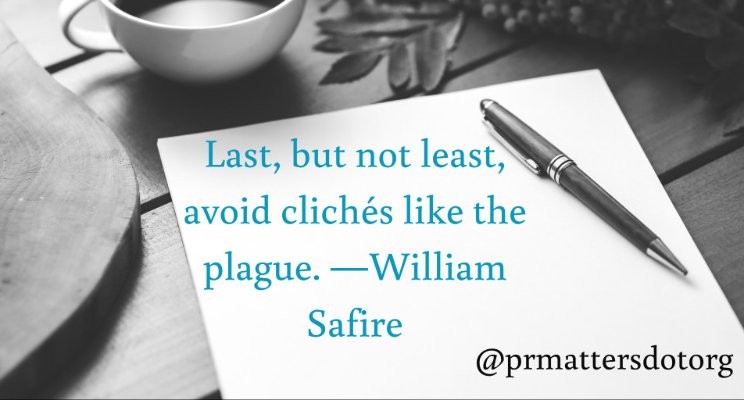
10 Tiresome, Useless Clichés to Eliminate from Your Speech and Writing
Clichés. Urgh. Can't live with them, can't live without them. (Tongue firmly in cheek and, granted, both expressions are idioms, as well as clichés, but then so are a lot of clichés.)
Actually, we definitely can live without them, and any self-respecting communicator will, I hope, agree. Sadly, however, too many of us tend to rely on clichés, in conversation and/or in writing. If you're guilty of this communications "sin", then you're really not doing yourself any favours.
You may find the person/people listening to/reading your words quickly switching off their own brain and pay less or little attention to what you're trying to communicate. Why? Because all cliches are mindless and boring.
- Why boring? Precisely because they've been repeated endlessly and everywhere by countless people over the years. By their very nature, they are innately unoriginal and incredibly tiresome to hear or read.
- Why mindless? Because they require no thought, no intelligence whatsoever. They're the lazy language equivalent of a brain fart. Worse than "erm", "aah", and "umm", those ubiquitous awkward conversation fillers. (And a polite sideways note to yourself on this point: if you have a tendency to use these, try to become aware of them and then force yourself to pause just for a moment, think about what it is you want to say, and then say it―without the filler. A moment's pause is far more effective and compelling to your listener than irksomely hearing you say "erm", etc., all the time.)
It would be far better for those inclined to spout clichés―and I find somebody who tends to use one, typically uses many―simply to pause, instead, in the same way recommended to avoid umming all over the place.
Far better, frankly, simply to move swiftly on to what you were going to say after your intended use of a cliché. Just make your substantive point. Doing so without the use of clichés will mean others pay better attention to you. Moreover, for the person on the receiving end of your conversation or writing, it'll be far less painful and irritating.
If you have to communicate a lot in your profession, whether in person or in writing―and who doesn't, unless you're some kind of recluse?―surely you want to be heard and read by others without them thinking you're lazy or indifferent about your words and meaning? To avoid any risk of them losing some respect for your skills as a communicator?
Unfortunately, there are many among us who resort―unthinkingly, lazily―to such use. Just consider TV news: almost immediately, you'll bump up against the sound of a reporter, politician or spokesperson using not one but many c-words, one after another. Shouldn't they―we, all of us―be more mindful and conscientious of how we communicate?
Perhaps this article sounds like a rant. If so, then not am I sorry, but I also want to assure you it's a heartfelt one―the rant and the apology (ahem)―with genuinely good intentions. After all, I truly wish to discourage you―each of us―from being indifferent communicators and, instead, to talk and write with attention to detail and care.
And it's not as if I'm the only comms professional with a gripe about this issue. Just take a look at Google search results on this issue, and you'll find plenty of articles addressing it and written by other equally passionate communicators who care―or rant, admittedly, myon your view―as much as this writer.
So, this is also a call to arms: I want you to hold yourself to a higher standard. To ask you to show yourself and others that, when you talk and write, you'll think all the way through your communication, and pay attention to what it is you actually want to convey. Because the way we use language is always an everyday opportunity to communicate with respect and consideration for others and, simultaneously, it demonstrates we also care about what we want to share with others.
So, here endeth my sermon. Now, for the fun part (I hope).
You'll find below my own personal, most hated examples of c-words. Yes, my top 10 most hated clichés, plus my critical―barbed?―commentary in parentheses. These are, for me, the equivalent of the sound of nails on a blackboard. I hope you hate them as much as I do, and will do your utmost to vanquish―or at least challenge―them when they are regurgitated in your presence. Perhaps, too, you could find a moment to share your other most hated in the Comments section of this post? I'd be delighted to add your best―or should I say, worst?―to this list and signpost it with your name as the contributor, and tag you in social media shares.
And a Polite Note for Those Who Have a Twitter Account: If you like any of them, please click it to tweet it. To avoid confusing your followers, each tweet will be prefixed by the title of this article―without the "10", of course―and it won't be published until you press the "Tweet" button.
2. Let me be clear. (Just be it. Please don't say it like every banal politician.)
3. At the end of the day. (Meaninglessly said 24 hours a day.)
4. To be frank with you. (Why now? Weren’t you before?)
5. Going forward. (Why? Were you previously going backwards?)
8. I'm a people person. (As opposed to what? A bug person?)
Yay. Now, here's a thank you bonus for reaching the end of this post: William Safire, the famous journalist and author quoted in this post's banner image, wrote a series of rules for writing: brilliant, deliberately "self-contradicting" (like the one I used), and wonderfully entertaining in their own right. I highly recommend them for your delectation and use.
Last, but not least: Don't forget, I'd love to know if you have any personal favourites you especially loathe: if you have a mo, don't hesitate to comment below.